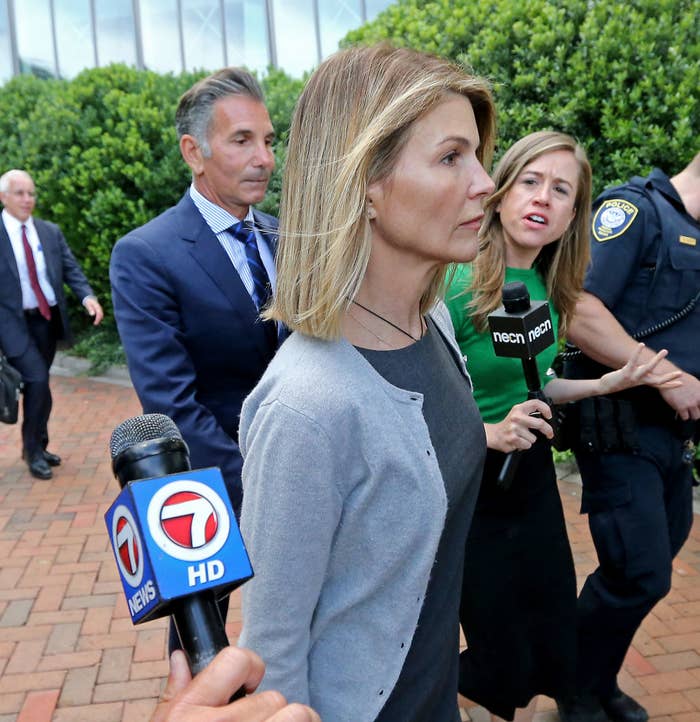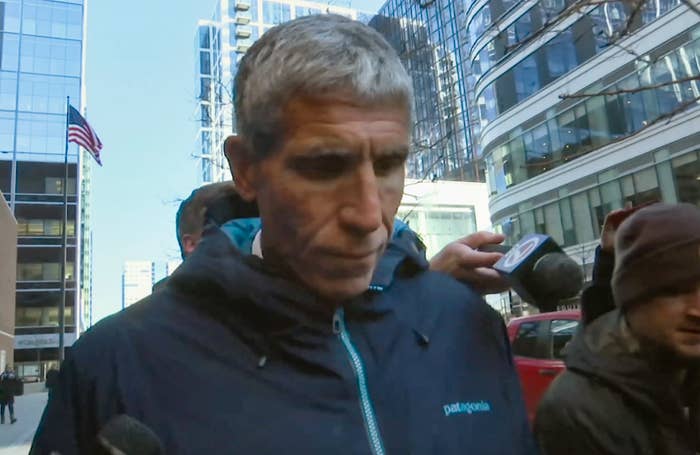
When news of the college admissions scandal broke in the spring of 2019, it was the perfect scammer story for the media to latch on to. Detail after detail emerged about wealthy parents who paid hundreds of thousands of dollars to buy their kids’ way into upper-tier colleges, as the FBI pursued indictments for mail and wire fraud; more than 50 people were charged.
Most of the public’s initial fascination was predictably fueled by the biggest celebrity names. Actors Felicity Huffman and Lori Loughlin, who once played wholesome moms on Desperate Housewives and Full House, respectively, became stand-ins for the entire brouhaha, as memeable icons of hypocrisy and privilege.
That Loughlin and her husband, Mossimo Giannulli, schemed on behalf of their daughter Olivia Jade, who’d already leveraged her celebrity proximity into a successful career as a beauty influencer, only made them bigger targets of derision. And the ridiculous staged rowing photos of her — faking sports backgrounds was part of the scam — helped ignite the social media roasting.
But those celebs weren’t really central to the scandal’s meaning or the actual scheme, both of which are examined and reframed in the documentary Operation Varsity Blues: The College Admissions Scandal, now streaming on Netflix. This savvy contextualization of the investigation is framed as a kind of thriller, chronicling the rise and fall of Rick Singer, the onetime high school basketball coach turned college admissions adviser turned outright fraudster who orchestrated the entire operation.
The documentary draws on FBI recordings of conversations between Singer and his clients, dramatized in cheesy but effective reenactments featuring unknown actors as the parents and a surprisingly compelling Matthew Modine as Singer (in a bad wig that is oddly fitting for this tale about fakery).
But the reenactments are interspersed with interviews with former Singer colleagues, investigators, and lawyers, all of which add up to a critique of the college prep industry, higher education in the US, and an entire class of entitled parents. Eschewing the obvious celebrity or maternal melodrama angle, Operation Varsity Blues skeptically treats most of the college admissions industry as a kind of scam unto itself.

Singer, who left high school coaching in Sacramento to become a college admissions adviser, is the documentary’s central figure. He first made a name for himself in the industry by, as one former colleague puts it, always being “fishy.”
He presented himself as a friendly admissions “coach,” helping families navigate the admissions process, and in his dressed-down, slouchy athletic attire he projected a kind of anti-charismatic relatability. But he’d make promises he couldn’t keep to parents, changed people’s ethnicities or races in applications, and lied to one couple about being responsible for getting their daughter into Stanford.
Eventually, he got into more overtly criminal territory by identifying a way to maneuver around one of the most shamelessly egregious ways in which the US class system and education collide: the “tradition” whereby billionaires who can afford to give Ivy League schools multimillion-dollar donations get a leg up on their kids’ admissions. (Jared Kushner is mentioned as one such mediocre student.)
Singer saw those donations as an overly expensive “back door” into elite schools. So he created a cheaper “side door” entry into top schools, requiring hundreds of thousands of dollars rather than tens of millions. He realized that niche sports — like fencing, water polo, rowing, sailing, and horseback riding — could be an easier way to get students into these schools, because their departments were underfunded and needed donations.
Further, admissions committees completely trusted recruiting coaches’ estimation of student athletes’ abilities. So Singer bribed coaches and athletic directors — a Yale soccer coach, a USC athletic director, a Stanford sailing coach — who would then accept students with nonathletic backgrounds as supposedly promising athletes. As part of his services, he also worked with standardized test proctors, who took the tests for his clients’ kids in order to raise their scores. Soon, he had a base of millionaire clients, like the Hot Pockets heir and lawyers, venture capitalists, and wine entrepreneurs, for whom he could guarantee admission.
The documentary makes clear that the admissions scandal wasn’t just about one scammer or millionaire parents, but that the entire system is rigged in favor of those who already benefit from being upper class. As one college admissions critic points out, the sports Singer targeted are activities that most students in the US wouldn’t even have access to. Even without Singer’s scam, the entire standardized testing industry feeds into existing inequalities; the best predictor for good test outcomes is household income. And the obsession with college rankings has led schools to redesign their admissions criteria in search of ineffable prestige.
Singer knew how to play on the parents’ weaknesses in search of that prestige — for instance, he guilt-tripped Huffman, suggesting she’d spent too much time on her career to get her daughter into a good college, and told other parents that their kids would never get into their desired schools with the scores they had, even if it wasn’t true.
The documentary peeks into the parents’ mindsets, exposing their class entitlement and clear-eyed ruthlessness. Michelle Janavs, the Hot Pockets heir, is caught on tape debating with Singer how to hide from her industrious younger daughter that they’re going to cheat to get her standardized test scores up. “My younger daughter is not like my older daughter,” she explains. “She’s not stupid. So if I said, ‘Oh, we’re going to take it up at Rick’s,’ she's gonna wonder why.” “It’s weird family dynamics,” Janavs says, “but every kid is different.”
A recurring theme in the recorded conversations with the parents is that they all wanted to get their sons and daughters into schools out of their range, despite the possibilities already open to them thanks to their built-in class privilege, while maintaining their kids’ innocence and belief in meritocracy.
Though they’re not a big part of the narrative, Loughlin and Giannulli seem to be an exception in that they hid nothing from their daughters. When a USC guidance counselor starts asking questions about their daughters not being on the crew team, Loughlin calls him a “weasel” in messages to her daughter; Gianulli writes, “Fuck him,” “nosey bastard.”
The FBI surveillance of Singer moves the unfolding drama along, forming mini portraits of the parents through their conversations with him. Smartly, it doesn’t try to humanize Singer or speculate much about his motives. (A former friend that he tried to date puts it best when she explains, “I really don’t know what made him happy or what his desires really were. “It’s almost like a rat on a wheel, trying to get to a means to an end, and there was really no end in sight.”)
Still, he remains a compelling cipher throughout, mediated through Modine’s reenactments. At one point toward the end of the documentary, we see the man himself in a footage reel for a reality show he tried to pitch about the families he worked with.
Yet despite some egregious cases — including a high school cheerleader he turned into a lacrosse player, or the fake rower Olivia Jade — no one ever caught on and Singer’s scheme was not exposed.
The entire scheme finally fell apart, in a kind of poetic justice, because one of his clients got prosecuted for securities fraud and offered the FBI information on one of Singer’s allies, a Yale soccer coach. He, in turn, informed on Singer. Singer then agreed to entrap the parents through phone calls.
Almost all of the parents involved were sentenced to months in prison, though Singer himself still hasn’t been sentenced. The series creates effective drama out of the schadenfreude, with real footage of the parents walking out of their court appearances and details about their sentences.
But Operation Varsity Blues doesn’t frame the arrests as easy answers to the problems it raises. The documentary is attentive to hypocrisy, for instance, about the fact that Stanford didn’t return the $700,000 that a sailing coach was fired for accepting, that colleges still deny that donations help people get accepted, and that the bloated college prep industry only gets bigger.
Operation Varsity Blues is a reminder that the college prep industrial complex — like college itself in the US — increasingly seems like a racket. In some dramatic final footage, we see a reporter chasing a shirtless but completely calm Singer, seemingly walking to his car from a workout. “Is the system broken?” the reporter asks. “Any comment on anything?” Singer doesn’t respond. But the answer is clear.●
